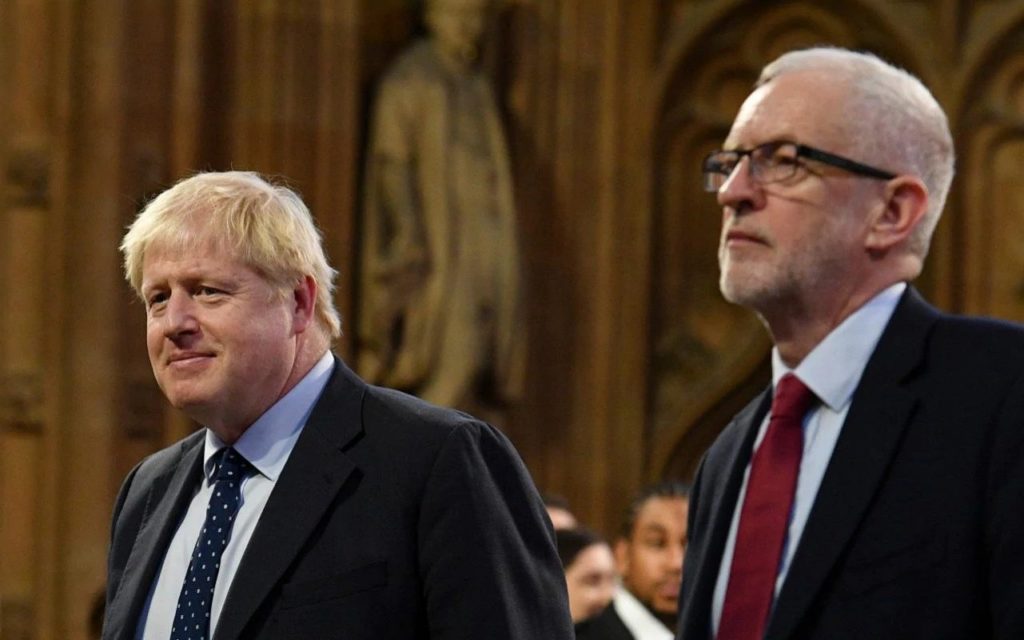BRUSSELS BEHIND THE SCENES
Weekly analysis and untold stories
With SAMUEL STOLTON
Other Brussels behind the scenes stories:
An Ideological War in Ol' Blighty
There is a perverse delight in being hurtled along at one-hundred miles per hour in a tin-pan tube, deep underneath the English Channel. At Pas-de-Calais, one commences ‘the fall’ into the yawning aperture of this channel of darkness.
I find this part of the journey on the Brussels to London St Pancras service rather sobering – a muted experience, encased in a cultureless echo chamber, the smell of bitter coffee from the train café discretely flirting with the senses, as the green flatlands of the Coquelles dissolve into darkness outside.
It is this leg of the trip in which the most interesting conversations are struck up - as if the experience of forced abstinence from the outside world induces people to interact with one another to a degree considered impossible in la vie courante. Needless to say, I nearly always chance upon colleagues, friends and foes on this journey. This week, I bumped into a UK official - seated not far from myself.
Sent out every Friday afternoon, BRUSSELS BEHIND THE SCENES brings the untold stories about the characters driving the policies affecting our lives. Analysis not found anywhere else, The Brussels Times' Samuel Stolton helps you make sense of what is happening in Brussels.
If you want to receive Brussels behind the scenes straight to your inbox every Friday, subscribe to the newsletter here.
It’s ‘down time’ for many of the Brits in Brussels at the moment – an election campaign ongoing in ‘Ol’ Blighty’, many UK journalists have been called back as reinforcements and several MEPs are considering standing in the general election itself. Until yesterday, the campaign had been plagued by tedium, with uninspiring and largely spurious rhetoric pursing from the lips of both Johnson – the condensed milk man-child, and Corbyn - the moth-bitten old Labrador.
And the throbbing dullness hadn’t gone unrecognised by UK officials in Brussels, with my train companion telling me that this was most likely a period of inertia emanating from ‘Brexit fatigue’. Perhaps the UK electorate have just been politically vegetized by the incessant rotations of nauseating, stale news items – fashioned out of the everyday machinations of power-hungry politicians bent by their own careerist drives and fraught jostles for public approval.
But all that is starting to change, as the ideological forces that prop up the leadership of both of the UK’s major parties tenderly start to uncloak themselves and display their differing skins in a confident parade of political nudity.
For the first time since Thatcher-Foot, 1983, - the two parties are about as far from one another as they could possibly be. Johnson, for his part, has exhumed insults heretofore resigned to the ideological earths of yesteryear – recently calling Corbyn’s plans to part-nationalise the UK’s broadband infrastructure a ‘crazed communist scheme.’
BRUSSELS BEHIND THE SCENES POWERED THIS WEEK BY
Yet, there is a dash of irony in Johnson’s invective – if we are talking about resurrecting Soviet-era ideologies, it is the Conservative party that has been embarking on its own campaign of political agitprop. Earlier this week, the party set up its own (biased) ‘fact checking’ Twitter account, to the ire of the social media platform – who said that the Tories had misled the public. Then later on, the Conservatives established a website called ‘labourmanifesto.co.uk’ – in a bid to befuddle web users searching for the real document, who, coming across the Tory-created site, would on the contrary find a series of smears against Labour’s vision for the country.
At the Labour manifesto launch yesterday, Corbyn took it upon himself to face down the UK’s super-rich - who he regards as being part of the Tory faithful. “The billionaires and the super-rich, the tax dodgers, the bad bosses and the big polluters – they own the Conservative Party. But they don’t own us. They don’t own the Labour Party,” he said.
Indeed, the red-book policies of the Labour manifesto are indicative of Corbyn’s ideological difference from anything else on offer to the UK electorate. For him, it is the return of Big State Politics. Pledges including 150,000 new council and social homes a year within five years, an immediate 5% pay rise for public sector workers and a "real living wage" of at least £10 an hour, will no doubt distinguish Corbyn’s brand of leftism from what else is on offer – be it the aggressively pro-EU globalist vision of the Lib Dems, or the socially conservative, Farage-fondling Tory front.
The palate of political paints hasn’t been this distinctive in a long time. And, such differences normally only ever contrast more intensely in the run up to a big voting day. While the UK election campaign did indeed commence with a languid and indolent air, like an animal rudely awaken from a deep stupor - anxious, possibly even suspicious about being stirred into action – the fact that there are profound ideological differences between the main candidates, means that the charge into the ballot boxes on 12 December will be fraught with virulent and vehement debate. A delicious theatre, in other words, for the political commentator.
The train leaps out of the English Channel and we emerge at the dank and half-dead heartlands of Folkestone. The sky is swollen by a grey bruise and the muddied fields are infertile at this time of the year – unable to contend with the harsh blade of late Autumn. This is a wounded land – pained by three years of malicious and invidious political bickering: the country has been exhausted almost into submission. Who on earth would know that one of the greatest ideological mêlées in recent years is just about to begin?
Sent out every Friday afternoon, BRUSSELS BEHIND THE SCENES brings the untold stories about the characters driving the policies affecting our lives. Analysis not found anywhere else, The Brussels Times' Samuel Stolton helps you make sense of what is happening in Brussels.
If you want to receive Brussels behind the scenes straight to your inbox every Friday, subscribe to the newsletter here.


